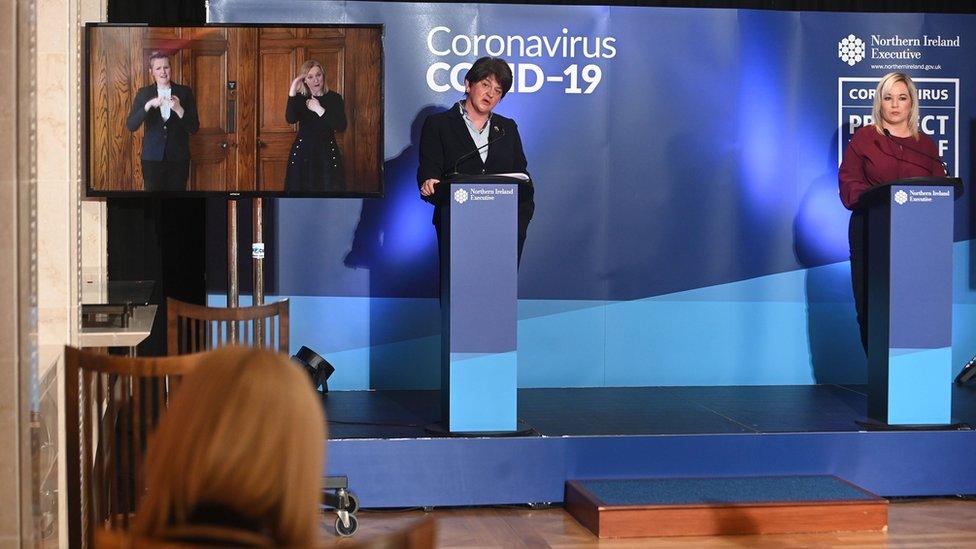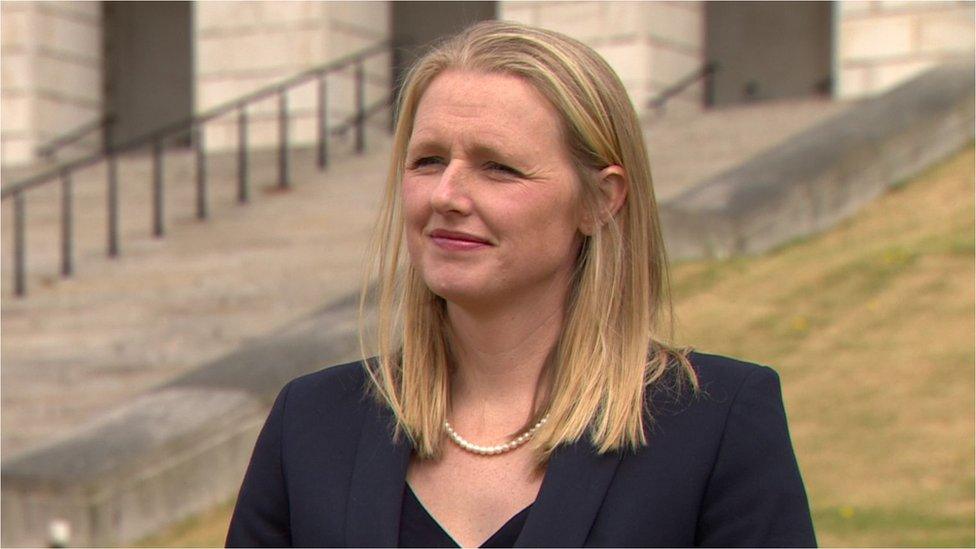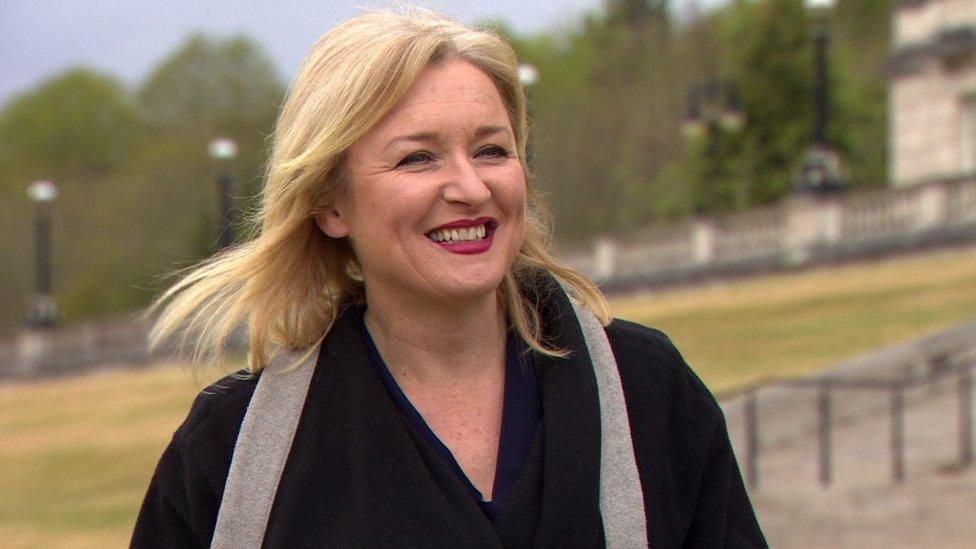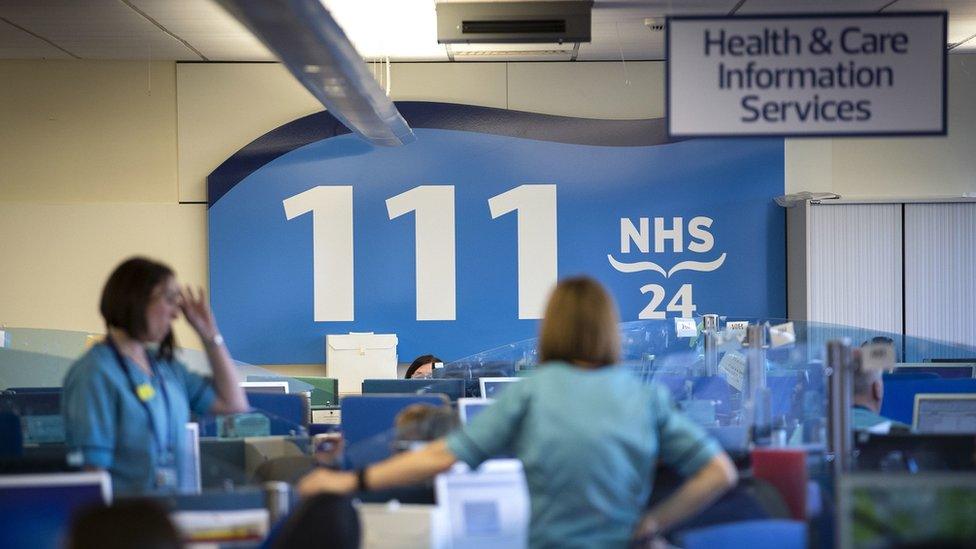Coronavirus: Signing news about the pandemic
- Published
- comments

Sign language interpreters Amanda Coogan and Kristina Sinclair (top left corner) have been seen at the Stormont briefings
How do you explain concepts like "coronavirus" or "social distancing" to an audience who cannot hear you?
For the past few weeks that has been the job of sign language interpreters Amanda Coogan and Kristina Sinclair.
The pair sign in both British Sign Language and Irish Sign Language at Stormont's daily coronavirus briefings.
Both have become as well known on our TV screens as politicians like Arlene Foster and Michelle O’Neill.
There are about 4,500 British Sign Language users and 1,500 Irish Sign Language users in Northern Ireland.
The evidence is that many members of Northern Ireland's deaf community are watching the news conferences many times over.
Kristina Sinclair got involved after her husband, who is deaf, was asked on Facebook if he knew anyone who could sign.

Kristina Sinclair says when the outbreak began a sign for coronavirus had to be created
Mrs Sinclair, after agreeing, then approached her friend, Amanda Coogan, and the impact of their involvement was instant.
“The first time I did it they were able to actually gauge how many were specifically looking at the sign language," Mrs Sinclair said.
Mrs Sinclair said their signing had garnered about 25,000 views online, with the British Sign Language interpretation amassing 20,000 views and the Irish Sign Language receiving 5,000 to 6,000.
"They're watching this every day, they're tuning in live because it's, actually, the only time that people can get information in their language," Mrs Sinclair said.
"Without this, there'll be nothing being presented to them in sign language."
'An indigenous language'
Amanda Coogan, who is a well known performance artist, uses Irish Sign Language at the briefings.
Irish Sign Language is the language of the deaf community in the Republic of Ireland and Ms Coogan explains that this should not be confused with its spoken counterpart.
Mrs Coogan explained that Irish Sign Language is "an indigenous language".

Amanda Coogan signs at every Stormont coronavirus briefing
She told the BBC at the briefings she translates Irish Sign Language from English.
"For me, as an interpreter, I would only go from English, I can only understand English. I'm not great with Irish," she said.
The pandemic presents particular problems for those who have to interpret it for the deaf.
Mrs Sinclair said "as soon as the coronavirus hit", the deaf community had to "come up" with a sign for that word.
"It is quite a visual sign. It's not necessarily the word, but it's more the concept," Mrs Sinclair explained.
However, Mrs Sinclair explained as the week goes on the deaf community get "more used to these concepts" and "we can flow into the translations a bit better".
Do they ever make mistakes?
Mrs Sinclair said some of the language they must interpret at the briefings is "very difficult", particularly around numbers.
"It's very difficult when they're telling us numbers and especially about the wonderful grant system that they have for businesses," Mrs Sinclair said.
"The executive does like to tell us the numbers quite a bit."
The interpreter admitted to owning up to making a mistake to her audience during one of the briefings.
"I just said to my audience: 'Sorry, the interpreter didn't catch that number.'"

A SIMPLE GUIDE: How do I protect myself?
AVOIDING CONTACT: The rules on self-isolation and exercise
LOOK-UP TOOL: Check cases in your area
MAPS AND CHARTS: Visual guide to the outbreak

Their efforts are not just appreciated by the deaf community, but by politicians as well.
First Minister Arlene Foster said the executive is trying to "communicate with the widest possible number of people in Northern Ireland and, of course, the deaf community".
"We want to be able to reach out to them and that's why the signers are here,” Mrs Foster said.
Deputy First Minister Michelle O’Neill said that a woman from Cookstown contacted her over the weekend to say how much "she looked forward" to the conference, because it was her "one source of information".
"The interpreters, unlike coronavirus, are probably here to stay," she said.
Sign language legislation will soon be introduced in the assembly, which should see the proceedings signed for deaf people on a regular basis.
- Published1 April 2020
